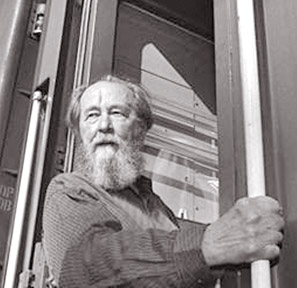Inspiring notes from a Nobel lecture
 It is a tradition that a recipient of a Nobel award, especially the
one for literature, has to deliver a lecture or an address as they
denote. As I had the chance to read some of these lectures in print
form, I felt I should share some of my feelings with you. One of the
most remarkable lectures come from the Nobel award recipient of 1970
Aleksandr Solzhenitsyn. The text was written by Solzhenitsyn in his
mother tongue, Russian, and translated into English by F D Reeve. It is a tradition that a recipient of a Nobel award, especially the
one for literature, has to deliver a lecture or an address as they
denote. As I had the chance to read some of these lectures in print
form, I felt I should share some of my feelings with you. One of the
most remarkable lectures come from the Nobel award recipient of 1970
Aleksandr Solzhenitsyn. The text was written by Solzhenitsyn in his
mother tongue, Russian, and translated into English by F D Reeve.
Let me place here one of the most illuminative factors he lays down
which presumably is everlasting and especially in our present context of
literary studies and evaluations.
‘The simple act of an ordinary courageous man is not to take part,
not to support lies! Let that come into the world and even reign over
it, but through me. Writers and artistes can do more; they can vanquish
lies! In the struggle against leis, art has always won and always will.
Conspicuously incontestably for everyone lies can stand up against much
in the world, but not against art.’
The truth about the most modern day creative writers, as I have
gauged, is that they have to abide by certain dishonest premises of
commercialism. The truth about creative writing is to be honest at all
times. This is highlighted by Solzhenitsyn in the following words. ‘In
Russian,’ he states, ‘proverbs about truth are favourites. They
persistently express the considerable, bitter, grim experience of the
people, often astonishingly: one world of truth outweighs the world.’
 |
|
Aleksandr
Solzhenitsyn |
In the course of his address he raises a valid point.
‘In this cruel dynamic, explosive world on the edge of its
destructions, what is the place and role of the writer?’ In a solemn
response he states a few factors as regards the true function of a
writer. In the first instance a writer is no sideline judge of his
fellow countrymen and contemporaries: he is equally guilty of all the
evil done in his country or by his people. If his country’s tanks spill
blood on the streets of some salient capital, the brown stains are
splashed for ever on the writer’s face.
If some fatal night, his trusting friend is choked to death while
sleeping, the bruises from the ropes are on the writer’s hands. If his
young fellow citizens in their easygoing way declare the superiority of
debauchery over frugal labour, abandon themselves to drugs or seize
hostages the stink of it mixes with the writer’s breathing.
In his Nobel address one more significant factor is his explanation
of the term ‘world literature’. He believes that though not laid down as
a strict academic concept, the term world literature had been existing
down the centuries.
He says: ‘In pastimes besides age old national literatures, there
existed a concept of world literature as the link between the summits of
national literatures and as the aggregate of reciprocal literary
influences. Solzhenitsyn also states that the writers had come to know
foreign writers and their works as they intermixed from one culture to
another.’ He emphasizes that ‘today, between writers of one country and
the readers and writers of another, there is an almost instantaneous
reciprocation.’
But Solzhenitsyn laments that due to certain political pressures.
Some of his books were unpublished in his own country. But later the ban
was lifted. Some of the most touching and sensitive areas that
Solzhenitsyn tries to capture are the difficulties encountered as a
writer in exile. It is the pen paper and memory that lives within such a
person. Most writers lived at ease, while Solzhenitsyn had his hardships
in exile. His books written in Russian were, according to him,
translated perhaps baldly into English.
But over the years he had the chance of seeing his works thus
translated receiving the attention via analysis and interpretation. In
this direction two significant works come to our mind. They are ‘The
Cancer Ward’ and ‘The First Circle’. On his 50th birthday he was
astounded to receive greetings from well known European writers. At this
moment Solzhenitsyn had realized that he had been taken seriously a
matter that he had not given much thought.
He says: “During all these years, when both my work and my freedom
did not collapse, when against the laws of gravity they held on
seemingly in thin air, I learned to my complete surprise, of the support
of the world’s writing fraternity.”
The task of the creative writer according to Solzhenitsyn is mainly a
dedication or a commitment to his own conscience. He expressed what he
sincerely feels despite the barriers that lay before him. “The task of
the writer,” says Solzhenitsyn “ is to sense more keenly than others the
harmony of the world, the beauty and the outrage of what man has done to
it, and poignantly to let people know.”
According to Solzhenitsyn certain impossibilities are proved to be
possible via a creative stand as a writer. He says ‘in failure as well
as in the lower depths in poverty in prison, in illness, the
consciousness of a stable harmony will never leave him.’
Stating generally about the creativity Solzhenitsyn says that art, in
a broad sense, warms even an icy and depressed heart, opening it to
lofty spiritual experience. By means of art we are sometimes sent dimly,
briefly revelations unattainable by reason.’
[email protected]
|



